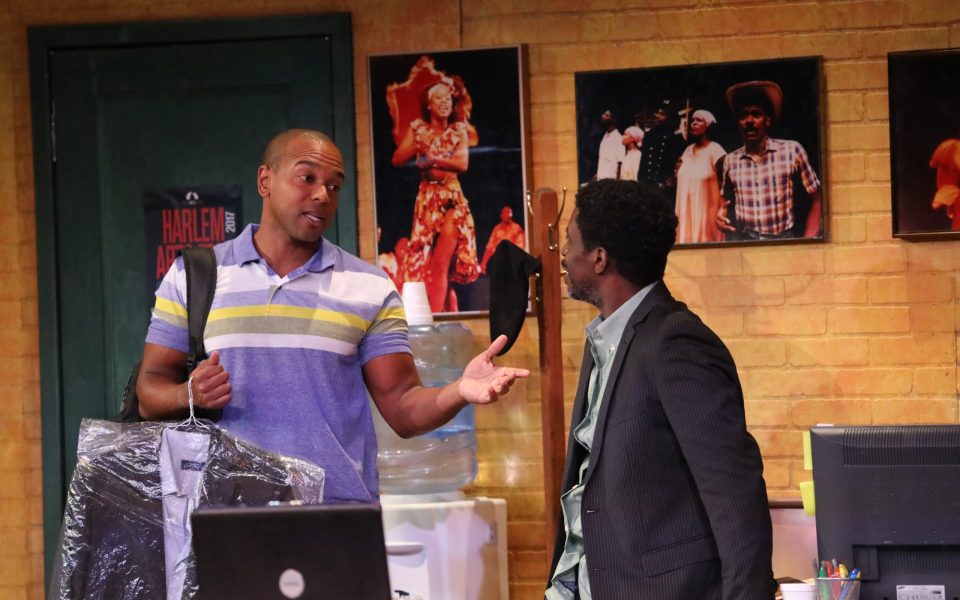Featured photo: Scenes from the opening night of ‘Succession’ at the NBTF 2022 (photo by Jerry Cooper) photo)
Rain pummels the walls of a historic brick building on Spruce Street, an ominous storm that threatens the hustle of downtown. But inside the building, there’s boisterous laughter, pulsing nervous energy, burning stage lights and the smell of pizza being delivered for actors and stage crew who will work late into the night. The National Black Theatre Festival is coming, and Succession rehearsals have begun.
The world premier of Charles L. White’s Succession challenges audiences of the National Black Theatre Festival to examine the importance of connection, and the magnitude of their relationships in Black theater.
Succession, produced and performed by the North Carolina Black Repertory Company, is the story of a young actor, Steve, whose dreams of Broadway stardom cause him to destroy the relationship with his mentor, Marcus, and abandon his community.
The battling dichotomy of white-washed theater groups and Black theater are not new concepts to writer Charles, “I submitted [Succession] and got a letter back saying, ‘Oh, it was interesting and the conflict was excellent, we just thought it was a bit too revved up for our taste,’” White explains. “It was not a Black theater group. They were an off-Broadway regional theater.”
Sekou Laidlow, the actor who plays Marcus in Succession, speaks of the financial difficulties Black theater and its patrons often experience.

“As artists, the financial often takes precedence or priority,” he says. “You need a place to live. You need food to eat. We want to make a living doing this. That’s often a show or opportunity that is not Black-led.”
The Asian-American Performers Action Coalition reports that theaters of color have received only 7.5 million in private funding, as opposed to predominantly white institutions that received over 132 million.
Justin Walker White, son of Charles White, who plays the role of Steve, further explains: “You can’t divorce it from money. What would Black theater be if a third of Broadway were Black-owned theaters. You can’t divorce the prestige from simple real estate and money. So we ask ourselves, ‘What is the soul of Black theater?’”
Succession challenges audiences to question the same. Are Steve’s actions in abandoning his beginnings justified? Has Marcus missed out on greater opportunities because of his age and unwillingness to negate Black theater? Can those inhabitants succeed while also keeping their connection to their origins intact?
“There’s this discussion in Succession about ‘is Black theater real theater?’” director Eric Little says. “‘Real’ meaning ‘white’ — the standard. And Black theater is real theater.”

The cast and crew of Succession, including Charles and Justin White, have their own roots in The National Black Theatre Festival.
“I came down to the National Black Theatre Festival in 2012, and [Charles White] said, ‘Why don’t you do a monologue at the monologue slam?’ So I did one,” says Justin. “And a guy at the National Black Theatre Festival came up to me and said, ‘You should audition for grad schools. For my school.’ They showed me that I should be studying this.”
Justin has now worked on several television series as well as most recently in Netflix’s newest action film, The Gray Man.
“All because mom and dad took me to the festival 10 years ago,” he says. “It all started here. The journey really started here.”

“I’ve been coming to the festival for a while, normally as a patron of the arts,” his father Charles says. “My wife and I would come to see all these plays and have a good time. I wanted to write something about the Black theater community, pay tribute to that.”
Laidlow, who, like his character Marcus, has been in theater and television for longer than most of his castmates, remembers his first experiences with NBTF.
“Around when I first started, about 25 years ago, I was doing a show in Virginia,” he says. “My friend and I came up on a Monday to the National Black Theatre Festival for the first time just to be at the gala, just to be around it. We are now positioning ourselves to be able to eat from our own work.”
Succession is a story of cultivating those relationships, burning bridges and the hope that others may recognize the importance of a supportive community, and the impact each person has on one another.
Laidlow reminds Succession audiences, “We all need each other. That’s what the village is all about. To give people an opportunity to come back. Letting people find their way. It doesn’t always fall within the context of what we might appreciate. But we can love people back.”
Succession runs Aug. 3-6 at the Milton Rhodes Center for the Arts-Hanesbrand Theatre. For more information, visit ncblackrep.org
Join the First Amendment Society, a membership that goes directly to funding TCB‘s newsroom.
We believe that reporting can save the world.
The TCB First Amendment Society recognizes the vital role of a free, unfettered press with a bundling of local experiences designed to build community, and unique engagements with our newsroom that will help you understand, and shape, local journalism’s critical role in uplifting the people in our cities.
All revenue goes directly into the newsroom as reporters’ salaries and freelance commissions.


Leave a Reply